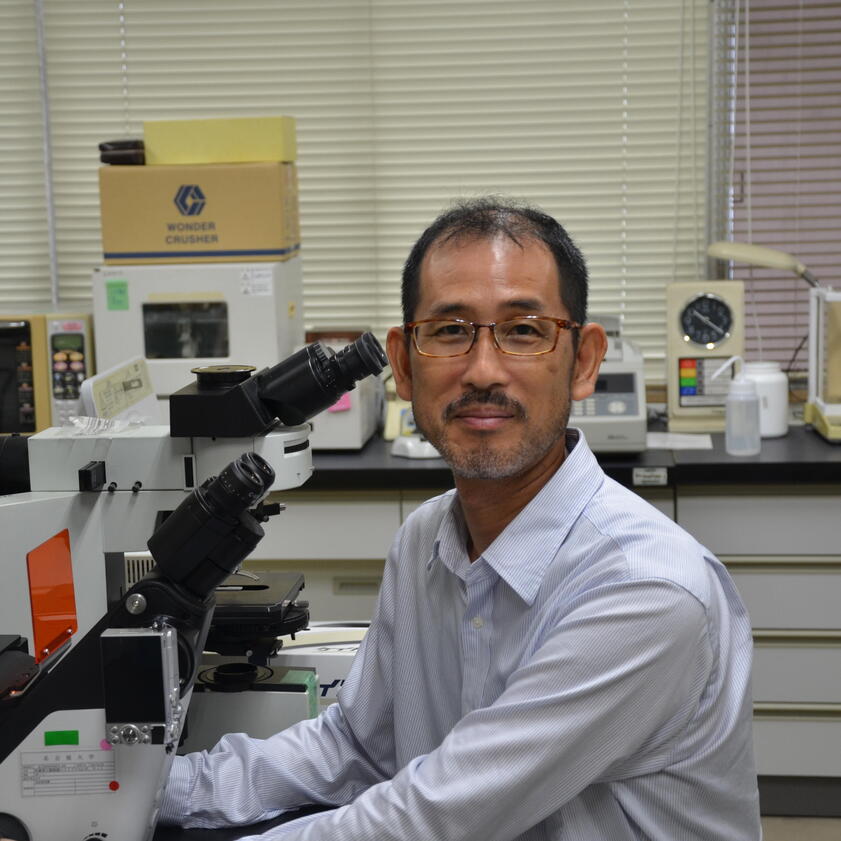Professor Ryuichiro Higashinaka

Researchers'
Professor
Jun Murase
Graduate School of Bioagricultural Sciences
Sorry, this is a bit long. It is from a collection of lyrics I loved to read when I was in high school, and there is actually more to it. It goes on to say, "...what is it that no matter what else is there, you are not fulfilled without, and no matter what else is missing, you are fulfilled?"
A German researcher whom I admire said that the goal of his research is "to know oneself." I do not think this is the same as "self-discovery," but both these words guide me when I return to my roots.
I study the diversity of microorganisms living in soil, which is the key to food production and global environmental conservation. It is said there are billions of microorganisms living in a spoonful of soil, but how are they involved in the functioning of the soil? Currently, I am interested in the effects of predation by protozoa (protists like ciliates, flagellates, and amoebae) on other soil microorganisms and effects of interactions between microorganisms on plants, which have been treated as minor issues even among specialists.
A quarter of a century ago, as a doctoral student in a graduate school, I was observing paddy soil under a microscope when I found a protozoa, which triggered my interest. I remember how I shouted with joy alone in the middle of the night when I saw them swimming gracefully in the field of view of the microscope, emitting fluorescence, which is a characteristic of certain symbiotic microorganisms. Since then, I have been fortunate to be able to continue my research, although the results have not been as successful as I had hoped.
When a question called "delusion" arises from my experience and past knowledge, I formulate a working hypothesis, construct and execute a design of experiments and observations to prove it, and finally turn the delusion into a fact (hopefully). This is when I feel the real thrill of being a university researcher. It is even more special when I am next to someone who says, "That is interesting."
It is still early days for me to fully convey the appeal of the farm, but I think the closeness to the field is the best part. Just by escaping the hustle and bustle of the city and sweating in the rice paddies and fields, walking in the grasslands, and looking at the cows and goats, ideas and perspectives that would never occur to me at the Higashiyama Campus sometimes "come" to me. Although the field is not large, it is diverse, and I look forward to it becoming a place for interdisciplinary collaborative research. We look forward to welcoming visitors from outside the Department of Agriculture!
I am the type of person who tends to dwell on things, so if there is a good way to relieve stress, I would love to hear about it. Maybe thinking things through until I give up might be the only thing I can think of, and also doing exercise.
I was blessed with opportunities to stay and conduct research in Southeast Asia and Europe during my time as a student (doctoral course) after I received my degree and after being appointed to my new position at Nagoya University. These experiences have led me to work as a faculty member in charge of international students, and I have been involved in international exchange programs within the university and its departments including the Bangkok Office. When I entered the master's program, I "took up" an overseas project research that had been started as a theme for undergraduates, and I am still secretly grateful to my junior colleagues who knew nothing about it.
Until now, I have mainly been conducting basic research on a small spatial and field scale to understand how soil microorganisms live. However, in the future, I would like to apply my findings to field-level soil research while collaborating with people in related fields.
Name: Jun Murase
Department: Graduate School of Bioagricultural Sciences
Title: Professor
Career history and hobbies:
Completed doctoral courses in 1994 at the Graduate School of Agriculture, Nagoya University. Worked as an assistant at the Faculty of Environmental Science, University of Shiga Prefecture, and as an assistant, lecturer, and associate professor at the Graduate School of Bioagricultural Sciences, Nagoya University (full professor since January 2019). His hobbies are bird watching and Japanese archery.